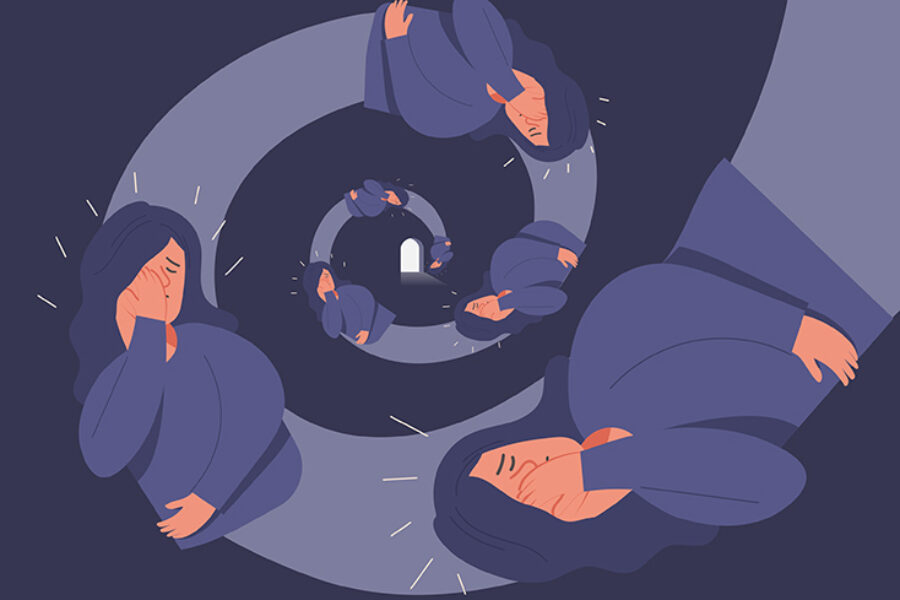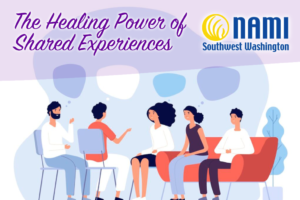By Megan Fisher
“Oh, trust me, I get it. I am so OCD, too!”
This cringeworthy statement, which far too many of us have heard in casual conversation, is generally followed by the speaker enthusiastically disclosing their “embarrassing” quirks, centered around color coding file folders or preferring an exceptionally clean kitchen. Perhaps they wanted their home to match the picture-perfect scene they found on Pinterest.
“You wouldn’t believe what I did yesterday,” they continue. “I organized all of my highlighters in the order of the rainbow! I can’t help just how OCD I can be sometimes.”
I am always tempted to reply with, “Oh, it’s so nice to meet someone who finally gets it! So how do you cope with the intrusive thoughts of killing your loved ones or dying alone or infecting everyone around you with a deadly virus?”
I never actually respond this way; instead, I keep quiet, struggling to find my place in the conversation.
Ultimately, these comments undermine the true suffering that OCD can cause, and they alienate people who actually live with OCD. Could a child with intrusive, terrifying thoughts identify with someone who simply enjoys cleaning? I certainly could not.
It’s worth noting that no two experiences with OCD are identical — and, for people whose OCD focuses on order and symmetry, the condition can certainly manifest as an obsession with cleanliness, organization or perfect angles. However, that presentation of the condition is also a painful experience and notably different from enjoying organization and aesthetics.
OCD Puts Me On Trial
The common misrepresentation of OCD — and the complete lack of conversation surrounding mental illness — contributes to my struggle to understand what is happening in my anxious brain. OCD is a constant underlying feeling of guilt, eagerly waiting to attach itself to something.
It is waking up and feeling panicked, attempting to both discover and forget the source of my guilt. The sense of panic lingers until I remember, “That’s what it is!” A red light I ran three years ago and the imaginary faces of the children I could have killed in the car crash. OCD is remembering a hurtful comment I made to my sister on Nov. 28, 2018, replaying the hurt look on her face and still feeling the lump in my throat. It is constantly thinking of the boy I made fun of when I was eight years old, the shameful jealousy I felt in my first relationship…The list goes on.
The disorder puts me on trial daily, convicting me of a lifetime of “crimes.” I plead guilty every time because my OCD always convinces me that it’s my fault.
OCD Burdens Me With The Weight Of The World
For me, OCD means facing every day with a daunting agenda. More specifically, it means worrying that every choice I make has a butterfly effect.
For those unfamiliar with the idea, according to the Chaos Theory, “It has been said that something as small as the flutter of a butterfly’s wing can ultimately cause a typhoon halfway around the world.”
OCD is believing that every action I take is the flutter of a butterfly’s wing, and every typhoon halfway around the world is somehow my fault. It’s the jar of peanut butter that I didn’t recycle, which led to climate change. It’s the fever I had in February that must have brought COVID-19 to the U.S. Sometimes, OCD is the notion that every decision I make might save or destroy our world.
OCD can feel like a horror movie with no pause button. It’s a disturbing scene from “Silence of the Lambs,” “The Changeling” or “Texas Chainsaw Massacre,” except I am starring as the cannibal, the kidnapper or the murderer.
It’s trying to think “happy thoughts” to desperately undo the evil ones, and intense shame for the thoughts I can’t control. It’s a montage of cancer, car crashes, suicide and homicide. OCD is bloody knuckles from knocking on wood to try to save my mom’s life. Four times. Twelve times. Seventeen ought to do the trick.
OCD Also Makes Me Compassionate And Resilient
Despite its challenges, OCD is responsible for some of my strengths. It is feeling intense empathy for the people I meet, leading me to lifelong relationships. It’s remembering every detail of a friend’s history. It’s the inexplicable joy felt after overcoming a fear. It’s a slightly obsessive work ethic that allows me to set goals and achieve them.
OCD teaches me to approach others free of judgement. It means never forgetting to say, “I love you” or “be safe out there.” OCD gives me the opportunity to live life with the knowledge that it’s precious and brief and something to protect.
No person is OCD; some people have OCD. An important step in changing the conversation surrounding mental health is acknowledging OCD for what it is — a mental health condition — which may or may not present as neat, tidy or color coded.
Megan Fisher lives in Seattle and she loves climbing, hiking and writing. She is eager to begin a graduate program at the University of Washington, where she will pursue a Master of Public Health in Nutrition. Megan cannot wait to serve the community as a pediatric dietitian at a non-profit clinic.
Source: https://nami.org/Blogs/NAMI-Blog/June-2021/The-Not-So-Pretty-Version-of-Obsessive-Compulsive-Disorder




